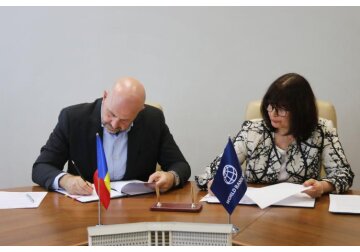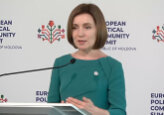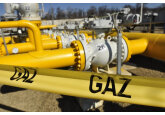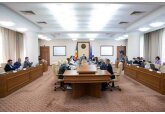
Moldova and the WB signed a $55 million (€50.1 million) loan agreement for the Moldova Agriculture Governance, Growth and Resilience Investment (AGGRI) project.
The document was signed on June 5 in Chisinau by Deputy Prime Minister and Minister of Agriculture and Food Industry Vladimir Bolea and the head of the WB Resident Mission in Moldova Inguna Dobraja. The AGGRI project will help Moldova improve delivery of public agricultural services, foster market-oriented growth and increase sustainability of target beneficiaries, while providing effective mechanisms of response to emerging crises. Vladimir Bolea expressed gratitude to the World Bank Group for helping our country, noting that AGGRI is a very important financing program, which Moldovan farmers have been waiting for a long time. The document brings together areas and priority areas of intervention for sustainable agricultural development. The matter concerns processes of strengthening AIPA and preparing the agency for access to European funds. It is about ANSA, which must guarantee food safety. At the same time, through this program it is planned to increase the potential of the livestock industry and increase the number of high-yielding cows. In addition, important steps will be taken to rehabilitate irrigation systems. According to the signed agreement, the World Bank will provide Moldova with a 50.1 million euro ($55 million) loan to implement the AGGRI project, pursuing several economic benefits: improving living conditions in rural areas and increasing incomes of project beneficiaries; creating new jobs by providing access to new market opportunities and technological innovations; increasing resilience of the agricultural sector to climate change by improving access to centralized irrigation systems, implementing climate-smart practices and improving the quality of life. The proposed public sector funding will be used to contribute to Moldova’s strategic objective of economic rapprochement with the EU, closing existing market gaps in terms of access to knowledge and investment financing, reducing emissions at the farm level and reducing the negative effects associated with climate change, and encouraging private sector investment. About $21 million is planned to be provided for stimulating initiatives on promotion and development of the livestock sector. Businesses will be encouraged to establish new dairy farms and modernize existing farms to increase productivity, improve product quality and reduce environmental impact. The money is also intended to bring in line with the requirements of the European market and expand access of Moldovan products to EU shelves. $25 million will be used to restore primary and secondary irrigation infrastructure. About $6.5 million will be earmarked to strengthen the capacities of AIPA and ANSA, as well as to support the creation of the Agricultural Advisory Center and Veterinary Centers of Excellence. About $2.5 million will be used to manage the project, which is a financing program for Moldova's agricultural sector until 2029. According to Inguna Dobraja, head of the WB Resident Mission in Moldova, the agricultural sector is vital for Moldova's economy and, with World Bank assistance the country will improve delivery of public agricultural services, stimulate market growth and increase sustainability of beneficiaries. She recalled that agriculture and the food sector are very important areas for Moldova's economy, pillars on which the country's economy rests, but agriculture also faces many challenges, mainly those related to climate change. "We are happy that we can help Moldova make the transition to sustainable agriculture. Signing the agreement is the easiest part, but the end results depend on the implementation processes," Inguna Dobraja said. In addition, she said, the project will help Moldova respond quickly and effectively to crises or emergencies should they arise. The loan itself will be repaid over 25 years, starting from September 15, 2028. The interest rate on it will be: the base rate plus the variable margin or the rate that can be applied to the loan. The one-time fee will be 0.25% of the loan amount. The commitment fee will be 0.25% of the unused loan balance. Since Moldova joined the World Bank in 1992, more than $1.3 billion has been committed to more than 60 operations, and the World Bank's portfolio now includes 12 active projects with a total commitment of $617.2 million.// 05.06.2023 – InfoMarket







